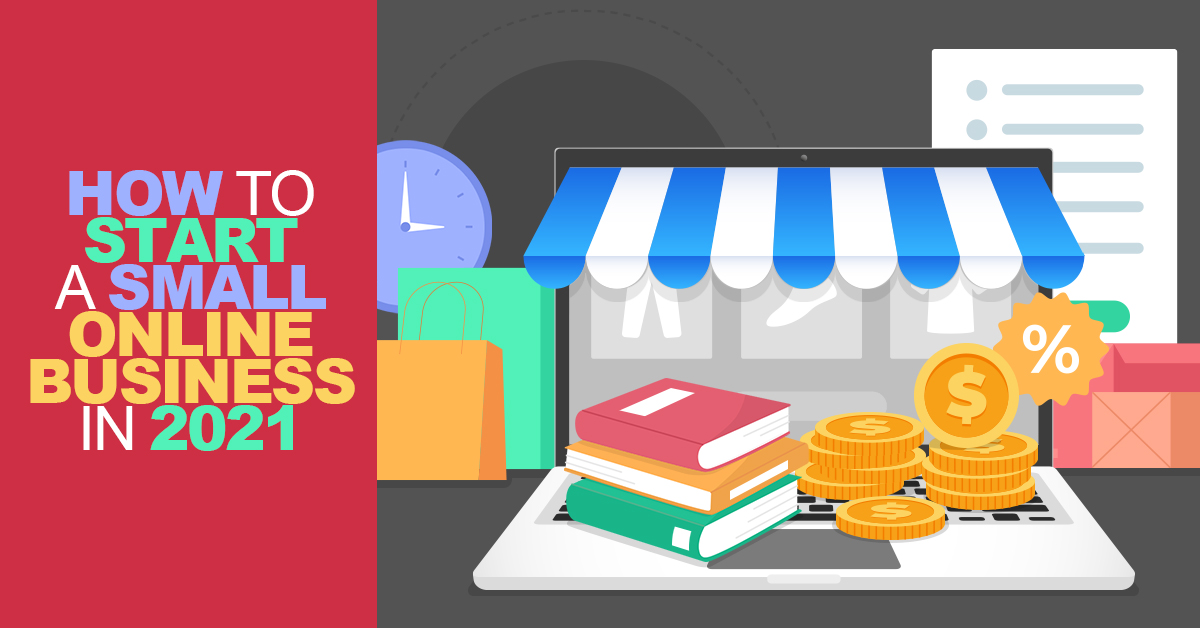Starting your own business is an exciting proposition. Some dream of building an empire from the ground up, while others envision more of an online side hustle. Fortunately, with today’s available resources, either scenario is doable. You only need to know what to focus on and where to start.
Today we’re talking to those of you who want to know how to start a small online business and the steps it takes to get up and running.
It’s no surprise that online businesses continue to pop up in every corner of the market. Globally, e-commerce makes up about 22% of all retail sales. Whether consumers are huddled up in their homes or shopping on-the-go with their smartphones, e-commerce is the new reality.
These retail conditions are providing the perfect backdrop for you to start a small online business.
But starting a small online business takes a little more than creating a pretty website and selling a few products. Before you decide to wing it, take some time to make a plan.
Planning will help you jumpstart your results, and perhaps a bigger payoff in the long run. Let’s take a closer look at the steps needed to launch your online dream today.
Essential steps to start a small online business
1. Research the market
Your first instinct may be to search high and low for the “right” product to sell and then find a suitable market later. But unless you have a product you’ve created yourself, you should start with the market instead.
The goal is to find a market where people are searching for solutions. Is there a void where needs aren’t being met? This may sound a little daunting, but you can find this information out for yourself with a little searching. Here are a few ideas for learning more about potential markets:
- Start from your own personal experience. Consider your background, education, and industry knowledge. Were there any needs or services you’ve felt were needed somewhere along the way?
- Choose businesses you’re interested in or have heard “buzz” about lately, then check out websites of your potential competitor. Is there a niche that isn’t being addressed?
- Join Facebook forums and see what questions are asked on a regular basis. For instance, if you join a local Mom’s group, you’ll notice if there is a service you keep seeing questions about or Mom’s looking for a particular product for their kids.
- Perform keyword research or use Google Trends to see what people are searching for and what questions these searches prompt.
Finding a potential market isn’t hard, especially if you know where to look.
2. Choose a niche
Once you’ve uncovered your target market, it’s time to drill down to your niche. A niche is a proper way of saying specialty. No matter what you call it, when you define your specialty it allows you to make plans and target your efforts.
What’s the difference between a target market and niche? Let’s say you’re considering becoming a bluehost
Pinterest Virtual Assistant for medical day spas as your online business. Your target market is medical day spas and your niche is marketing on Pinterest.
By identifying your ideal client, you now know which clients to target and where to market your own business. This keeps you from feeling all over the place, which is helpful when dealing with the vast internet.
If you need a little more inspiration for ideas on a small online business, here are a few more ideas for you to consider:
- Digital marketer
- Virtual Assistant
- Social media management
- Website developer
- Freelancer (graphic design, writing, photography, calligraphy)
- Sell a physical product
- Online course creator
A word of caution here: you might not find your exact niche right away. Don’t let it slow down your efforts though! You can always define it at a later point, but knowing your target market ahead of time gives your online business further direction.
For example, maybe you know you want to serve medical day spas but you start out offering “digital marketing” and then later realize that Pinterest gives them the best results. So you become a Pinterest expert and only market that skill.
3. Research your industry
The next step is the research phase, even though you may feel like you’ve already completed a ton of research. This is where you learn everything you need to know about the industry your online business falls under, as well as how to properly set up your own business.
Spend time researching the following:
- Best practices
- Trends
- Marketing strategies in the industry
- Potential clients
Plus, you need to properly set up your business. You should research to find out:
- How to set up a legal business entity
- Doing taxes for your own business
- Your own marketing efforts
- How to sharpen your skills and continuing education for yourself
Continuing with our Pinterest VA idea, you should understand the latest trends with Pinterest, the best practices for marketing on Pinterest, plus marketing your own services.
4. Get your business online
Now comes the fun part, it’s time to make it official by setting up your website and developing your brand.
- Choose your business name. What will you call your online business?
- Purchase a domain name for your website. Ideally, it will be close to the name you’ve chosen for your business. Make it easy to remember!
- Create a logo. Bring a little identity to your business by creating a logo. You can find freelancers to do this for you too, if you’re stuck on the creative process.
- Set up your website. There are tons of online resources for setting up your own website and selecting a hosting service for your site.
- Create content for your website. Content comes in many forms and one of the most important pieces of content is your landing page. What do people see when they first come to your website? Make it attractive, informative, and easy for people to contact you.
- Call in the professionals if you need to. If you’re having trouble understanding your taxes or other aspects of business, don’t be afraid to call in the professionals. Especially if it ends up saving you time in the long run.
- Set up your social channels. Your business needs a profile too, so make sure your business has its own social channel where appropriate.
Whatever you do, remember it’s not going to be perfect! It never is when you’re first starting out. The important point is to start. You can make changes and update your small business as you go.
5. Develop a marketing strategy
No matter the size of your business, developing a marketing plan is an essential part of launching and growing your business. Fortunately, there are numerous paths you can take to let everyone know your online business is ready for prime-time.
A marketing plan not only helps you create new business, but it also provides focus for your online endeavor.
You can get as creative as you want, and there are several strategies you can use that require minimal investment. To launch your business you could:
- Start networking either in-person or via LinkedIn.
- Announce via your social media channels (Facebook, Instagram, Twitter, LinkedIn, Pinterest).
- Invest in targeted ads, such as with Facebook Ads or Pinterest.
- Create blogs to put on your site, use keywords in your blogs to attract new readers.
- Pitch your potential customers. Reach out to potential customers, even if it means cold pitching.
- Use job boards such as Upwork or Fiverr to offer the services of your online business.
- Plan a launch by sending out emails or announcements via social media.
Marketing shouldn’t be an afterthought, but instead should be one of the foundations to launching your online business. The only way to reach people is to let them know you’re there and how your business can solve an issue.
6. Stay focused and provide the best service possible
Once you start gaining clients or selling products, the best business decision you can make is to provide great customer service. No matter how big or small you are, good customer service goes a long way in today’s world.
Providing great customer service takes on many forms, including:
- Easy to get in touch with you via social channel or email or chat bot
- Quick response
- Professional demeanor
The best part is, providing an exceptional customer experience requires little up front investment, but goes a long way towards your online business’ growth.
In addition to good customer service, look for opportunities to upsell your clients with additional products or services. You can use loyalty programs, newsletters, or product recommendations to connect with your buyers again.
The bottom line
When you’re ready to start your online business, careful planning and research is always a good idea. A small online business is as important as a big one. Plus, you never know, your small side hustle may one day end up becoming your career.
But before you get to that point, education is key. The more you learn up front, the more successful your small online business can become.


Leave a Reply